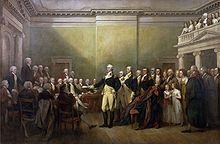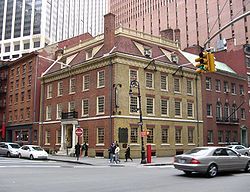“Punting the Pundits” is an Open Thread. It is a selection of editorials and opinions from around the news medium and the internet blogs. The intent is to provide a forum for your reactions and opinions, not just to the opinions presented, but to what ever you find important.
Wednesday is Ladies’ Day.
Thanks to ek hornbeck, click on the link and you can access all the past “Punting the Pundits”.
Follow us on Twitter @StarsHollowGzt
Katrina vanden Huevel: Eradicating AIDS
On March 24, 1987, the activist group AIDS Coalition to Unleash Power (ACT UP) gathered in front of Trinity Church on Wall Street in New York City for its first ever demonstration. The flyer advertising the event was crammed with damning facts (“AIDS is the biggest killer in New York City of young men and women”), indictments (“President Reagan, nobody is in charge!”) and the desperate rage of people who were done being ignored (“AIDS is everybody’s business now”). [..]
When ACT UP took to the streets three decades ago, AIDS was a death sentence. Nobody knew what caused it and nobody knew how to treat it. Today, that is no longer the case. We have cutting-edge drugs that keep people alive. We have evidence-based models for prevention. We have global awareness of the epidemic.
What we lack is the political will and compassion to reach out to the most marginalized among us and make sure that they have equal access to prevention and care. Ending AIDS is no longer a matter of science – it’s a matter of justice.
Jill Filipovic: Get real: covering contraception doesn’t violate employers’ religious freedom
The supreme court is hearing arguments that Obamacare violates company owners’ religious freedom. It’s a bogus claim
Are for-profit companies persons entitled to First Amendment free religious exercise protections? Should the religious beliefs of the controlling stakeholders of your employing company dictate the healthcare you receive? Does providing healthcare to employees substantially burden a corporation’s religious freedom when that healthcare includes contraception coverage? Those are the questions the US supreme court will address in its review of two cases brought by companies who don’t want to pay for contraception under Obama’s healthcare law. The court’s answer could significantly alter the landscape of the American workplace and First Amendment rights forever – quite possibly in dangerous ways.
The supreme court is hearing two of the 70 pending cases on the issue, one brought by the conservative Christian owners of a chain craft store with 15,000 employees of various faiths (the Hobby Lobby), and one brought by the Mennonite owners of a wood cabinet company. No one debates that the owners of these companies have sincerely-held religious beliefs. The question is whether, by mandating that the companies provide healthcare for their employees, the religious beliefs of the company are being violated.
Thanks to a loophole that subsidizes CEO pay, McDonald’s, Yum Brands, Wendy’s, Burger King, Domino’s, and Dunkin’ Brands trimmed $64 million from their tax bills in 2011 and 2012.
The fast food industry is notorious for handing out lean paychecks to their burger flippers and fat ones to their CEOs. What’s less well-known is that taxpayers are actually subsidizing fast food incomes at both the bottom – and top – of the industry.
Take, for example, Yum Brands, which operates the Taco Bell, KFC, and Pizza Hut chains. Wages for the corporation’s nearly 380,000 U.S. workers are so low that many of them have to turn to taxpayer-funded anti-poverty programs just to get by. The National Employment Law Project estimates that Yum Brands’ workers draw nearly $650 million in Medicaid and other public assistance annually.
Meanwhile, at the top end of the company’s pay ladder, Yum Brands’ CEO David Novak pocketed $94 million over the years 2011 and 2012 in stock options gains, bonuses and other so-called “performance pay.” That was a nice windfall for him, but a big burden for the rest of us taxpayers.
Zoë Carpenter: The End of Dark Money?
Last spring, news that the Internal Revenue Service used keywords like “Tea Party” and “Occupy” to select groups applying for nonprofit status for extra scrutiny prompted media outrage, resignations, internal investigations and a series of congressional hearings. There was comparatively little fury about the fact that many of these “social welfare” organizations were getting tax breaks in exchange for flooding elections with anonymous cash.
The power these dark money groups wield in future elections could be undercut by a new proposal from the IRS, which would put clearer boundaries around the political activities of 501(c)(4) nonprofits. Released just before Thanksgiving, the guidelines lay out some specific definitions of “political activity,” that social welfare groups would have to limit in order to retain their tax-exempt status, such as expressing an opinion about a particular candidate.
Watchdogs are encouraged that the Obama administration has affirmed the need for clarity on the laws governing social welfare groups and their influence in elections. But the rules as written are broad, limiting activities like voter registration drives, get out the vote campaigns and candidate debates. Many groups see these as critical civic engagement programs, and essentially nonpartisan.
Rose Ann DeMoro; The Real Fix for Obamacare’s Flaws: Medicare for All
There’s no reason to rollback the progress the ACA has made. But we should go all the way and dump the for-profit system
Lost amidst the well-chronicled travails of the Affordable Care Act rollout are the long term effects of people struggling to get the health coverage they need without going bankrupt.
If that sounds familiar, it’s because that’s been the main story line of the US healthcare system for several decades. Sadly, little has changed.
Still, with all the ACA’s highly publicized snafus, and less discussed systemic flaws, there’s no reason to welcome the cynical efforts to repeal or defund the law by politicians whose only alternative is more of the same callous, existing market-based healthcare system.
US nurses oppose the rollback and appreciate that several million Americans who are now uninsured may finally get coverage, principally through the expansion of Medicaid, or access to private insurance they’ve been denied because of their prior health status.
At the same time, nurses will never stop campaigning for a fundamental transformation to a more humane single-payer, expanded Medicare for all system not based on ability to pay and obeisance to the policy confines of insurance claims adjustors.
Jesica Weisberg: [The US and Canada Are Failing Asylum Seekers www.thenation.com/blog/177427/us-and-canada-are-failing-asylum-seekers]
We may think of Canada as our kinder, more generous neighbor, but a new study by the Harvard Immigration and Refugee Clinic indicates that the country’s has adapted a decidedly un-Canadian approach to refugees. The authors of the study write that Canada is “systematically closing its borders to asylum seekers and avoiding its refugee protection obligations under domestic and international law.” Canada’s policies are driving migrants and refugees to the United States, where they may encounter a detention system that “falls far below international law requirements.” According to UN standards, asylum seekers should not be detained at all, but the authors write that the United States repeatedly holds refugee applicants in custody for months, and even years, at a time.
It’s hard to say which country comes across better-or worse-in the study. Since last year, when Canada passed a series of reforms to its refugee system, it has implemented various bulwarks to deter refugees from even arriving at the Canadian border. The Safe Third Country Agreement makes it almost impossible to enter Canada by land, as it prohibits asylum seekers who first set foot in the States to then apply for refugee claims in Canada (the agreement also applies to those who first arrive in Canada and then apply for US residency, but for geographic reasons, that scenario is far less frequent). Canadian Liaison Officers are now able enforce border laws from foreign posts-they’re stationed in forty-nine different locations-and intercept more than 4,000 people from boarding a plane or a boat to Canada each year. (As a point of comparison, US Customs and Border Patrol officers with a similar set of responsibilities can be found in just eight countries.) Canada has also been found, per the report, to outsource immigration enforcement to airlines and various private transport companies, meaning that asylum seekers don’t even have the opportunity to discuss their case with an immigration agent who may be more empathetic when, say, a passport is missing or a visa has been denied. Private companies, meanwhile, have been found to treat passengers inappropriately and to deny entry based on minor inconsistencies or gaps in identification papers. Canada’s approach is referred to as “pushing the border out”-or creating physical barriers far away from state lines, making the border more ephemeral yet more exclusive.
Barbara Garson: Spy vs. Spy: Walmart’s Corporate Surveillance on Black Friday
I took part in one of the 1500 Walmart protests this past Black Friday. It gave me a new perspective on NSA Surveillance. [..]
Employees organize because they want to improve their working conditions and their pay. It’s effective to show them that joining a union is a quick way to reduce your pay to zero. There’s no reason to be subtle about it.
Maybe that’s why it was easy for my husband to snap a picture [attached] of two Walmart people observing and photographing the demonstrators. Like the Pinkertons of earlier strike busting tradition, they have no reason to hide the fact that they have their eyes on you. But some of Walmart’s neo-Pinkerton surveillance capacities still surprised me.
At one point the woman with the camera checked a hand held “device” and told the man with her that the demonstrators across the highway were about to “moblize.”
I don’t know if she got her information through sophisticated tapping of the organizers or merely following our twitter feeds. But it reminded me that I personally have more to fear from corporate espionage then NSA spying. Unless you’re a fundamentalist terrorist, (or an American who will never need a raise,) you probably do, too.



Recent Comments